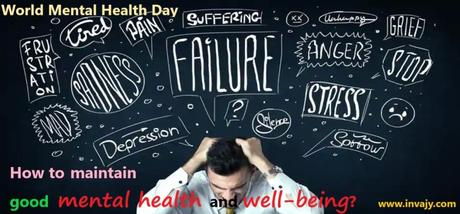Today on World Mental Health Day, I recall a news which shook me deeply at that time. In March 2012, Ma, a senior student from Jinling Institute of Technology in Nanjing, Jiangsu province scheduled the suicide note to be posted automatically about 12 hours after her death, at micro blogging website Sina Weibo. Her sucide note appeared as “I have depression, so I want to die. There’s no important reason, and you shouldn’t care about my leaving this world. Bye bye”.
In another recent case in April 2018 in India, Telugu news anchor V Radhika Reddy jumped off the 5th floor of her Hyderabad apartment and left behind a suicide note that said, “My brain is my enemy.”
In both the cases mentioned above mental health conditions may have driven the young ladies to end their life, but these aren’t the only one. Anybody from the businessman working in the cut throat competitive environment, to sales professional chasing targets and deadlines, to the journalist doing exhaustive shifts or that teenager glued to the mobile or tablet seated next to you in the Metro train could be nurturing a mental health condition.
World Mental Health Day – 10th October is a good reminder that it is crucial to talk about mental health. Mental health problems are more common than you may think.
In fact, one in every five adults in USA i.e approximately 43.8 million people experience mental illness. This is 18.5% of our total population of America. (Source: National Alliance on Mental Illness)
According to the National Mental Health Survey of India, 2015-16: Mental Health Systems, an estimated 150 million or 15 crore people need mental health intervention and care in the country.
Awareness about maintaining physical health has increased in last decade or so. Conscious people are enthusiastic and hitting to gyms, cycling and marathons. But unfortunately same is not true in the case of mental health; awareness of mental health issues is still a biggest challenge across the globe.
Reasons of mental health issues
One of the biggest reasons for mental health problems today is the pressure to live up to the expectations of parents, family members and society. Success and acceptance have become dominant, often at the cost of one’s mental well-being. Definition of success has changed and earning money has become synonyms to success. In Indian context, earlier people could unwind the worries in a communal social setting such as the joint family, the local pan shop, the chai ki thadi or adda (tea shops), or common interest groups. But, now kids are not going out of their home and living isolated life right from the early days of their life. Nuclear families have increased leaving behind the benefits of joint family.
With the advancement of communication, smartphones and internet has reached every corner of the world, but with due course of time, it has shown its negative effects in the form of social isolation.
Apart from these the main contributing factors in mental illness are Biological factors -such as genes or brain chemistry, Life experiences – such as trauma or abuse and family history of mental health problems.

Early Warning Symptoms
Major or intense mental health issues such as severe depression, schizophrenia or bipolar disorder rarely appear out of the blues. Most often family members, friends, colleagues, teachers or individuals themselves begin to recognize or observe small changes or a feeling that “something is not quite right” about their thinking, feelings or behavior before an illness appears in its severe or full-blown form. If you are not sure that you or someone else near you is living with mental health problems, experiencing one or more of the following thoughts, feelings or behaviours can be an early warning symptom of a mental health problem :-
- Changed sleeping or eating habits i.e. sleeping or eating too much or too little
- Social withdrawal or isolation i.e. pulling away from people and usual activities
- Energy drains i.e. having low or no energy
- Negative feelings i.e. feeling numb or like nothing matters
- Screaming or fighting with spouse, children, parents, family members and friends
- Feeling exhaustive, hopeless or helpless
- Addictions like smoking, drinking, or using drugs
- Apathy i.e loss of initiative or desire to participate in any activity
- Feeling unusually confused, forgetful, on edge, angry, upset, worried, or scared
- Frequently having unexplained body aches and pains
- Suffering severe or rapid mood swings that cause problems in relationships
- Illusions, hearing voices or believing things that are not true
- Thinking of harming yourself (suicidal thoughts) or others (killing or murders)
- Nervousness i.e fear or suspiciousness of others or a strong nervous feeling
- Fear of unknown and abnormal anxieties affecting performance of day to day life like taking care of your kids or getting to work or school
Mental health professional help should be seek in case of persistent presence of above several symptoms at one time and changes in your feeling, emotions and behavior should be discussed with him/her.
How to maintain good mental health and well-being?
- Spot your early warning signs. Be more aware how you are feelings and behavior. The early you can spot your warning symptoms, the easier it would be the cure.
- Identify what’s affecting your mental well-being. We’re all different human beings with different resistance level towards causes of mental health issues. What affects your mental well-being won’t necessarily affect others in the same way.
- Build your self-esteem. Increasing your self-esteem can help you to feel more confident and you will be able to challenge adversity.

- Look after your physical well-being. Everything is psychosomatic, your mental and physical health are closely linked. Work on your physical fitness and welling, it will help in good mental well-being. Do regular exercise and move your body, monitor your BMI.
- Quit and get rid of addictions smoking, alcohol and drugs. You may think that drinking and taking drugs boosts your confidence. But these can have a negative effect on your mental well-being. Smoking is the biggest threat of not only cancerous diseases; it also augments the negative thinking.
- Have proper sleep. Getting too little or too much sleep can have a big impact on how you feel. It causes reduces irritability, anxiety and mood swings.
- Be more social and invest time in relationships. Connecting with positive people and investing in good relationships are important for your mental health. Spend quality time with friends, loved ones and people you trust. Surround yourself with good friends. Talk about or express your feelings regularly with them.
- Eating habits not only affects your physical health but also the mental health. Eat balanced diet, which provides adequate amounts of complex carbohydrates, essential fats, amino acids, proteins, vitamins, fibers, minerals and water. Timing of eating also affects your mental health, never skip your breakfast and eat your dinner at least three hours before sleeping.
- Develop good habits; try to adopt good morning rituals, which will improve your overall mental health being. Read article on morning rituals.
- Practice Mindfulness, mindfulness can help you feel better and reduce stress. It is easy to fit into your day. You can do it four to five minute at a time.
- Be grateful, practicing gratitude can do wonders for your mental well-being. Being thankful will increase positive vibrations and you will get heal through law of attraction.
- Meditation and Yoga can be incorporated in daily life for good mental health. It’s scientifically proven that it helps in healing mental illness.
- If you are facing severe mental health issues, please don’t get stuck with social stigma, consult and seek the help of mental health professional.
Thank you for reading this. Over to you now, please share your valuable views about mental well-being in the comment section, they are much appreciated.
If you have liked this article, please share it at your favorite social networks.

